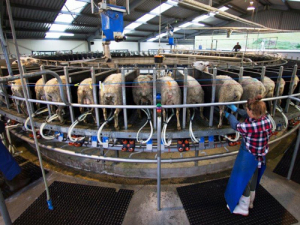Blue River Dairy eyes new markets after China success
Sheep infant nutrition maker Blue River Dairy is hoping to use its success in China as a springboard into other markets in future.
 Farmers interested in milking sheep need to take a “watching brief” on the Government's new Primary Growth Partnership programme.
Farmers interested in milking sheep need to take a “watching brief” on the Government's new Primary Growth Partnership programme.
It's not the time yet for farmers to start getting into dairy sheep, but those interested need to keep a “watching brief” on the Government's new Primary Growth Partnership programme.
So says Spring Sheep Milk chief executive Scottie Chapman.
“In the first instance we have to get the model to work,” he told Rural News.
“New Zealand has been doing this for about 10-15 years and we are still well behind best practice and ability to actually make this work commercially.”
Chapman says the whole purpose of the Primary Growth Partnership programme, in the short term, is to get a model which works, builds interest and gets people involved to come and see it.
“In time, once we’ve got a model that works, we will look at extending it and encouraging other farmers to get involved,” he says. “It is still a few years before they can make it work.”
But Chapman is convinced that long term it is an opportunity for farmers.
“I would suggest to farmers, keep a watching brief, keep an eye on it, follow the numbers, follow what we are doing; it will all be public.”
He believes the most logical places for farms will be near processing, mostly around Waikato.
“Logic says in the short term that is where the opportunities will be. How it plays out in the long term remains to be seen.”
The PGP has several parts to it, he says.
“One is getting the market insight so we are getting consumer demand; the next is research and development to produce those products the consumer wants; the other part is onfarm management and the genetics.”
Chapman believes that NZ has a sensational ability to convert sheep milk into products of value.
“So there is no point in replicating the stainless steel that exists in the dairy industry. It is incredibly well run and looked after so we will continue the current dairy processes; we don’t need to reinvent that wheel.”
Spring Sheep Milk currently uses Waikato Innovation Park’s dryer for the bulk powder then it moves on to processing and canning plants.
“That’s only the powder; we also have gelato and other products. We can use existing NZ players and we will. It is another great advantage for NZ Inc.”
Chapman says they can pick and choose what processing facilities they need, according to what consumers say they want, instead of building a factory and having to process the product.
“It’s global, it’s in the Western world as well. There just happens to be a bigger prevalence in Asia. For them goat or sheep milk are a lot more digestible.
“So the three factors we are selling on are taste, digestibility and nutrition.
“Sheep milk products provide an alternative for those who potentially have a bovine intolerance. Bovine milk is a very good healthy product for most people but if you have an intolerance, there’s an alternative that has the calcium and protein without the digestive issues.”
The World Wide Sires National All Day Breeds Best Youth Camp Best All Rounder plaudit has become family affair, with 2026 Paramount Cup winner Holly Williams following in her sister Zara's footsteps.
DairyNZ is giving New Zealand farmers a unique opportunity to gain hands-on governance and leadership experience within the dairy sector.
Herd improvement company LIC has posted a 5.2% lift in half-year revenue, thanks to increasing demand for genetics.
According to the latest Fresh Produce Trend Report from United Fresh, 2026 will be a year where fruit and vegetables are shaped by cost pressures, rapid digital adoption, and a renewed focus on wellbeing at home.
The Roar is a highlight of the game hunting calendar in New Zealand, with thousands of hunters set to head for the hills to hunt male stags during March and April.
OPINION: The past few weeks have been tough on farms across the North Island: floods and storms have caused damage and disruption to families and businesses.

OPINION: Meanwhile, red blooded Northland politician Matua Shane Jones has provided one of the most telling quotes of the year…
OPINION: This old mutt has been around for a few years now and it seems these ‘once in 100-year’ weather…